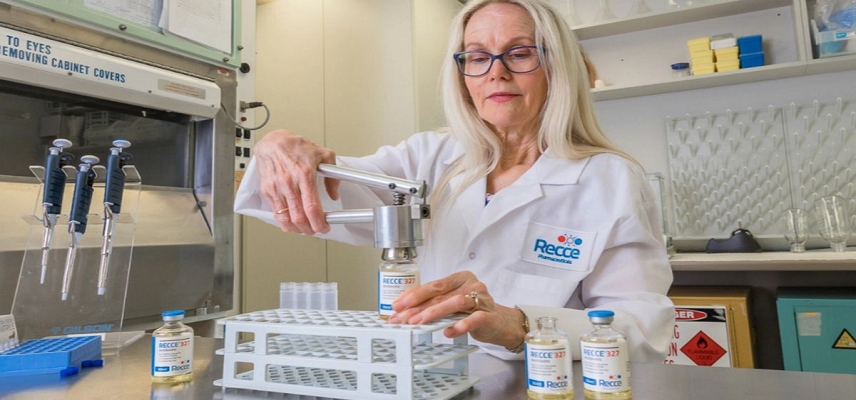Recce Pharma Reports Positive Phase II Results for RECCE 327 Gel in ABSSSI
Recce Pharmaceuticals Ltd, a global company developing a new class of synthetic anti-infectives, has announced positive data from a phase II clinical trial evaluating RECCE 327 topical gel (R327G) for the treatment of acute bacterial skin and skin structure infections.
“These impressive results underscore the potential of our topical gel to meet critical unmet medical needs in infection treatment, said James Graham, CEO of Recce Pharmaceuticals. “As we advance towards registrational phase 3 trials in Indonesia and Australia, we are encouraged by the rapid efficacy and strong safety outcomes demonstrated in this study. The global acute bacterial skin and skin structure infections treatment market is a substantial commercial opportunity, valued at $7.3 billion in 2018 and expected to reach $26 billion by 2032, at a CAGR of 9.5% between 2019 and 2032. Going forward with our clinical programs gives us great confidence in addressing ABSSSI.”
Alan Dunton, MD, director & chief medical advisor of Recce Pharmaceuticals, added, “Our robust dataset, from pre-clinical, clinical, and TGA special access scheme use cases, gives us confidence in the potential of our topical gel. These results reflect the broad-spectrum nature and rapid onset of the effect of R327G, which positions us well for the upcoming phase 3 trials in Indonesia and Australia. Importantly, Recce has also demonstrated that its R327 anti-infective compounds are effective in vitro against diverse species of bacteria, including over 500 clinical isolates, many of which were previously considered drug-resistant.”
Phase II trial assessed the efficacy and safety of RECCE 327 topical gel in patients with acute bacterial skin and skin structure infections, including those with diabetic foot infections (DFI).
Study objectives exceeded, with a 93% primary efficacy endpoint achieved for R327G over 14 days of treatment.
After seven days of treatment, 86% of patients (25 out of 29) treated with R327G had a successful clinical response. At 14 days of treatment, 93% of patients (27 out of 29) achieved a primary efficacy endpoint. R327G demonstrated to be safe and well tolerated, with no serious adverse events reported, achieving all endpoints.
The study enrolled 30 patients, with 29 included in the final data analysis. One patient was withdrawn due to pre-existing pain at the wound site that was deemed unrelated to R327G.
Data confirms the approach for the approved registrational phase 3 DFI study in Indonesia, where efficacy can be confirmed earlier in the trial through interim analysis and read-out expected in 2025.
Study to progress to registrational phase 3 trial in Australia for ABSSSI and DFI trial results reinforce the unprecedented efficacy of Recce’s synthetic technology, now in late-stage clinical trials, facilitated by an innovative regulatory strategy, supporting an accelerated commercialization pathway into 2026.
Driven by the high response rates in this study, experts have determined the company’s current registrational phase 3 study for diabetic foot infections (DFI) can meet a statistically significant positive endpoint after completing approximately 100 patients compared to the study baseline of 300 patients. The Indonesian Drug and Food Regulatory Authority (Badan POM) approved protocol has a built-in interim analysis. The Company anticipates completing this data set by the end of the year.
This phase II study achieved all primary and secondary endpoints as an open-label clinical trial evaluating the safety, tolerability, efficacy, and plasma pharmacokinetics of R327G when applied directly to the infected area. The trial included both men and women with a minimum age of 18 years old and no maximum age limit. The data received from this trial aligns with the US FDA’s increased demand for novel broad-spectrum antibiotics (such as R327G) to address antimicrobial resistance. ABSSSIs are a significant healthcare concern, encompassing indications such as DFI, necrotizing fasciitis, and post-operative wound infections. There are no ABSSSI placebo-controlled studies as international regulators deem withholding appropriate treatment of patient infections unethical.
The trial used US FDA-accepted diagnostic tools for assessing the severity of patient wounds, including the Lipsky Clinical Resolution of Infection Scale and/or the Bates Jensen Wound Assessment tool. The study’s investigators used these methods to evaluate wound healing and subsequently rated patients as either cured or improved. Both assessments (cured/improved) demonstrate that wound healing has been observed, with cured meaning a complete clinical response and improved demonstrating partial wound healing with the potential of a cure beyond the 14-day timeframe.

Optimize Your trial insights with Clival Database.
Are you exhausted from the uncertainty of trial insights pricing? Clival Database ensures the clarity in the midst of the global scenario for clinical trials to you.Clival Database is one of the best databases that offers an outstanding number of clinical trial data in terms of 50,000+ molecules and from primary regulatory markets as well as new entrants like Indian and Chinese markets.
With Clival, you get accurate positioning of historical sales data, patent database, company profiling, safety & efficacy, and prediction of launch of new innovative molecules helping you to align your research and driving down the cost.
To add value, we further break down our analytics for you so that improving your operational effectiveness; optimizing your clinical trials; and offering you accurate and high-quality data at lowest possible prices becomes possible.
Elevate your trial success rate with the cutting-edge insights from Clival database.
Check it out today and make more informed sourcing decisions! Learn More!







